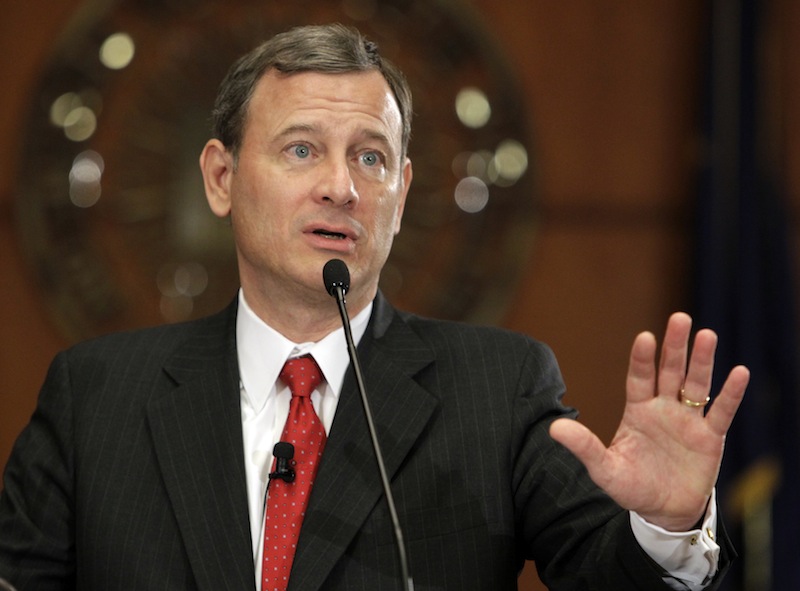On Wednesday, Chief Justice John Roberts used a slim five to four majority to strike down a major part of the 40-year-old “aggregate limits” on federal campaign donations. Is the decision as bad as Citizens United, the Court’s 2010 decision to overturn a century of precedents and allow unlimited expenditures by corporations seeking to elect or defeat political candidates? No … but it’s not good. If Citizens United is the Charlie Sheen of bad decisions that undermine electoral equality, then the McCutcheon decision is the Justin Bieber — smaller in scale but with plenty of capacity to do harm.
Until Wednesday’s ruling in McCutcheon v. Federal Election Commission, aggregate limits meant that an individual could give no more than $123,200 to federal political candidates and political committees in any given election cycle.
Now, thanks to the Roberts Court, wealthy donors can give $5,200 to an unlimited number of candidates running for the Congress and the Senate, as well all the official party committees. In other words, one big donor can now pump well over $3 million into federal campaigns through direct candidate giving
Will this ruling unleash a wave of new mega-donors? Maybe. But since less than 1,000 donors nationwide hit the federal aggregate limit in 2012, the ruling’s first impact may be to redirect the existing flood. Billionaires like Sheldon Adelson, the Koch Brothers and their counterparts on the left have been spending huge sums to influence elections for years. Empowered by Citizens United, they directed the bulk of their recent donations through a web of independent outfits like Americans for Prosperity, Freedom Works, and Priorities USA. McCutcheon now allows them to give more of their money directly to the coffers of elected officials. If there is any silver lining here, it is that politicians and political parties are more accountable to citizens and have less to gain from hyper-partisanship and gridlock than independent groups.
And yet, silver linings obscure larger ugly truths: the McCutcheon ruling is wrong on the law, and bad for America. It is one more in a set of decisions that began in the mid-1970s, in which the Court has ruled that political donations and campaign spending are a form of protected speech under the First Amendment. Because the Court has held that money is speech, they have increasingly frowned on regulating or limiting political money.
The Roberts Court took this logic to a previously unimagined level with Citizens United and, via McCutcheon, now solidifies a dangerously narrow view of what constitutes electoral corruption via political donations. The Court’s majority defined the standard to only include “quid pro quo” arrangements whereby donors give money in return for specific legislative or executive action. More systemic corruption, where those who finance elections look very different than most Americans and have different policy interests, is not corruption at all, in the eyes of the Court. And it is preciously this sort of “donation vacuum” accelerated by McCutcheon that political scientists find produces policies that increasingly benefit the affluent at the expense of everyone else.
Expect no end to the nonstop, year-round fundraising and endless campaign commercials that plague our democracy with this decision either. For candidates, McCutcheon will just increase the pressure to raise money from big-money donors. And already, as scholars like David Broockman and Josh Kalla have shown, money means access.
Worse, the Court has rejected an essential consequence of its money equals speech formulation – if people don’t have enough money to make political donations, they cannot fully participate as citizens. By Chief Justice Robert’s own reasoning, working class and poor people cannot speak nearly as much as the rich. Does government have any responsibility to help balance the scales, and ensure that the voices of the rest of us are not drowned out by those of the very wealthiest? The chief justice says no.
And then there’s the irony of the Chief Justice’s activism. The Court here, as in Citizens United, is assigning to itself, rather than to the elected members of Congress, the power to determine a complex public issue on which the Constitution is largely silent.
What’s the bottom line? Roberts’ decision will do nothing to slow down, and will likely accelerate a trend of increasing inequality. More and more these days, full citizenship is restricted to those in the middle class and above, and serious clout is mainly for the very top. The Roberts Court has no problem with that.
Avi Green is Co-Chair of the Scholars Strategy Network‘s Working Group on Protecting and Expanding the Right to Vote. Erin O’Brien is an Associate Professor of Political Science at the University of Massachusetts Boston.






